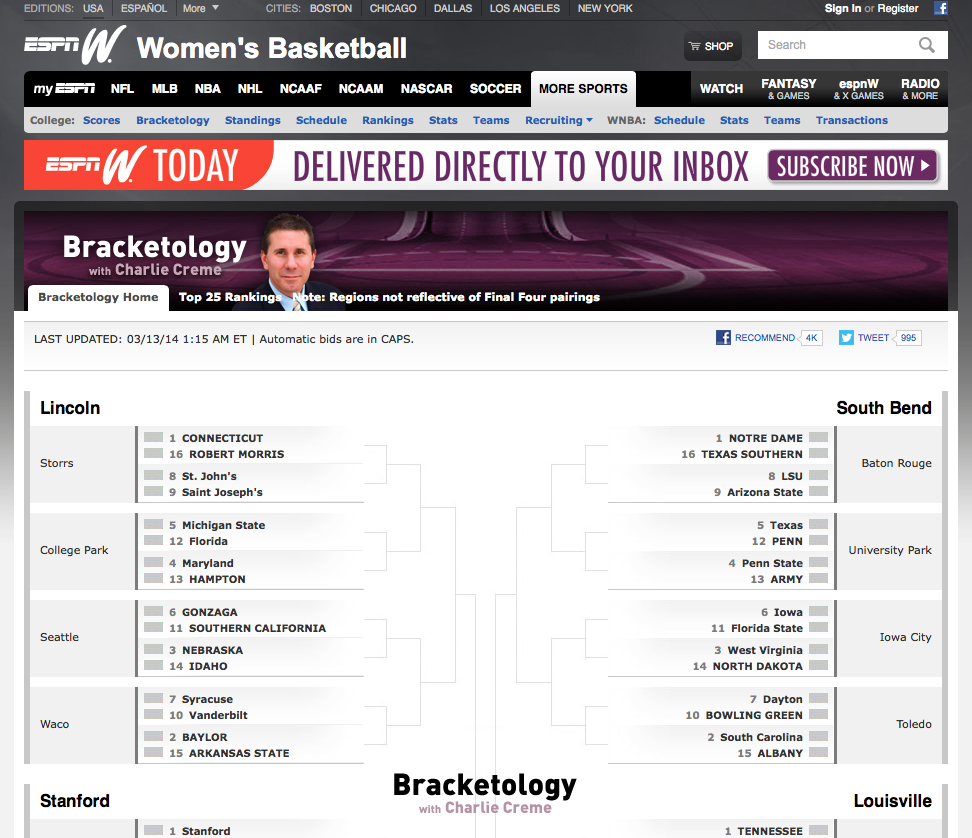Creme ready to rise to the top with his women’s Bracketology projections

Heading into the home stretch of ESPN’s Championship Week, ESPN women’s college basketball Bracketologist Charlie Creme continues to tackle his daily predictions for the upcoming NCAA Women’s Basketball Championship – which will unveil its bracket exclusively on the NCAA Women’s Basketball Selection Special Presented by Capital One on Monday, March 17 (7 p.m. ET, ESPN).
Front Row caught up with Creme to discuss his decade-plus involvement with the women’s bracket.
Never on the bubble
Joe Lunardi has been predicting brackets for ESPN.com since 1995, and has earned the title of ESPN Resident Bracketologist with his accuracy and detailed approach to selecting teams to the now 68-team NCAA Men’s Basketball Championship.
Front Row pulled Lunardi away from his Bracket Laboratory for some pre-selection reminiscing:
Which year stands out as the one you predicted most accurately or are most proud of? That would have to be last season. Getting all 68 teams, including the No. 1, No. 2 and First Four selections exactly, was definitely a highlight. It’s more frantic at the bubble with the additional at-large selections added two years ago, and it brings so many more teams into the mix.
Another highlight was 2008, when we were able to post an extremely late bracket and include an SEC tournament upset. That was a 65-for-65 year.
What year still stumps you after seeing the NCAA selections? I missed three teams in 2011, including VCU, and realized some of my metrics (and weighting of same) needed an upgrade. I had never missed more than 1-2 teams in any year prior to that. Since, we’ve missed one, one and zero teams. This year, who knows, there are still an awful lot of moving parts at this point.
How did you start in the predicting the bracketing business?
It began about 20 years ago working side-by-side with Joe Lunardi [see sidebar] when the need for predicting the field became necessary for another project we were involved in.
You begin Bracketology early in the year, how much variation do you see by the end of season?
There is usually plenty of variation, perhaps not right at the top, but the rest of the field typically unwinds very differently.
In your 11 seasons predicting the bracket, what is the wildest scenario that has played out?
The 2009 bracket was very confusing, if not wild. With regard to placing teams, the committee did the exact opposite of what they had done the year before and had no true rationale for the 180-degree shift in philosophy. It didn’t catch much attention around the country because most were so upset about the committee placing UConn and Rutgers together in 2008, but the lack of inconsistency jumped out at me. That 2008 decision or 2011, placing Texas A&M and Baylor together in the Dallas Region, may have been the wildest in terms of public outcry.
Looking back, which year stands out as the one you predicted most accurately and which year still stumps you after seeing the NCAA selections?
Last year was probably my best overall. I missed just one at-large team and was only off more than one seed line on six teams. In 2011, I missed three at-large teams, which was definitely my worst year in terms of sheer numbers. I am still mystified Texas got in over Michigan that year.
How many games do you watch a week, and how do you get your information to make the Bracketology selections?
Once January hits I probably watch at least parts of 6-10 games a week. Sunday is a big day for viewing and the day to work out the bracket. I pull information from the RPI, a few other metric-based websites, school websites and read stories on women’s basketball from around the country. That helps in keeping up with injuries and other player news.
Editor’s note: ESPN’s extensive multiplatform coverage of Selection Sunday on March 16 will include studio shows across ESPN, ESPN2 and ESPNU; the ACC, SEC and Sun Belt Championships; and the debut of ESPN Films’ 30 for 30 documentary “Requiem for The BIG EAST.”







